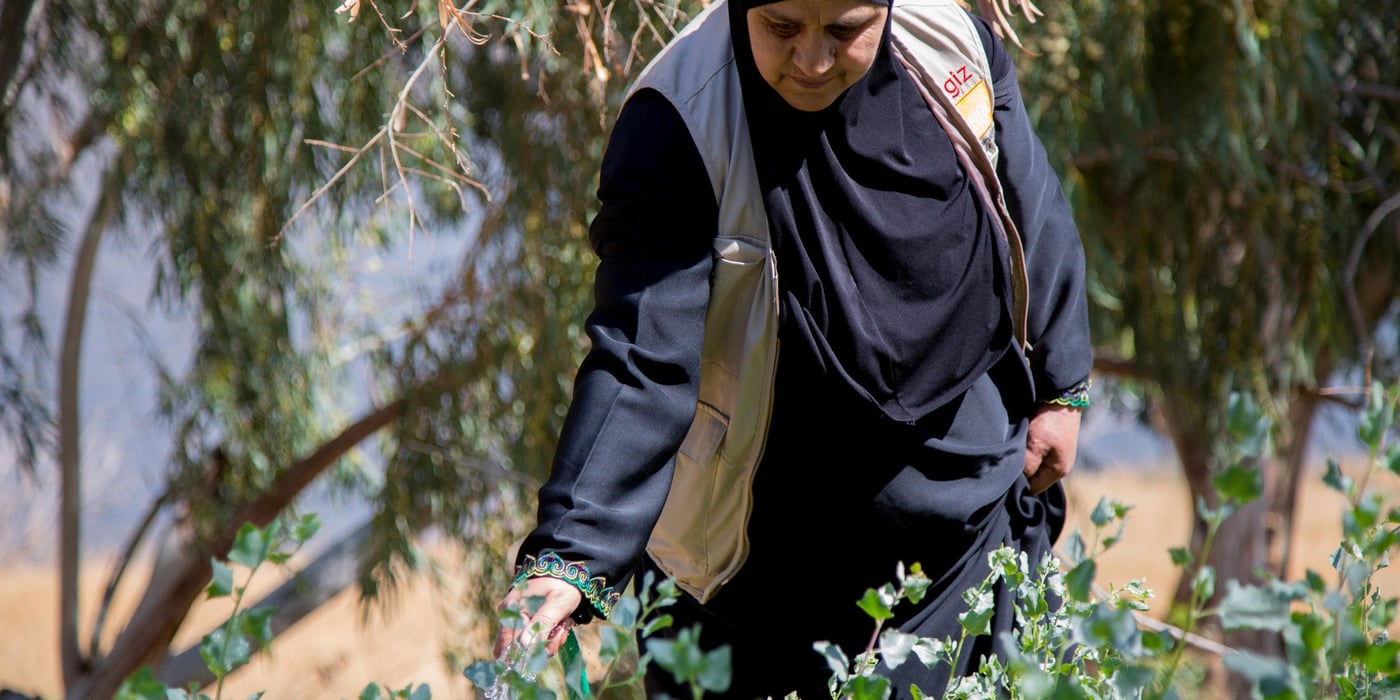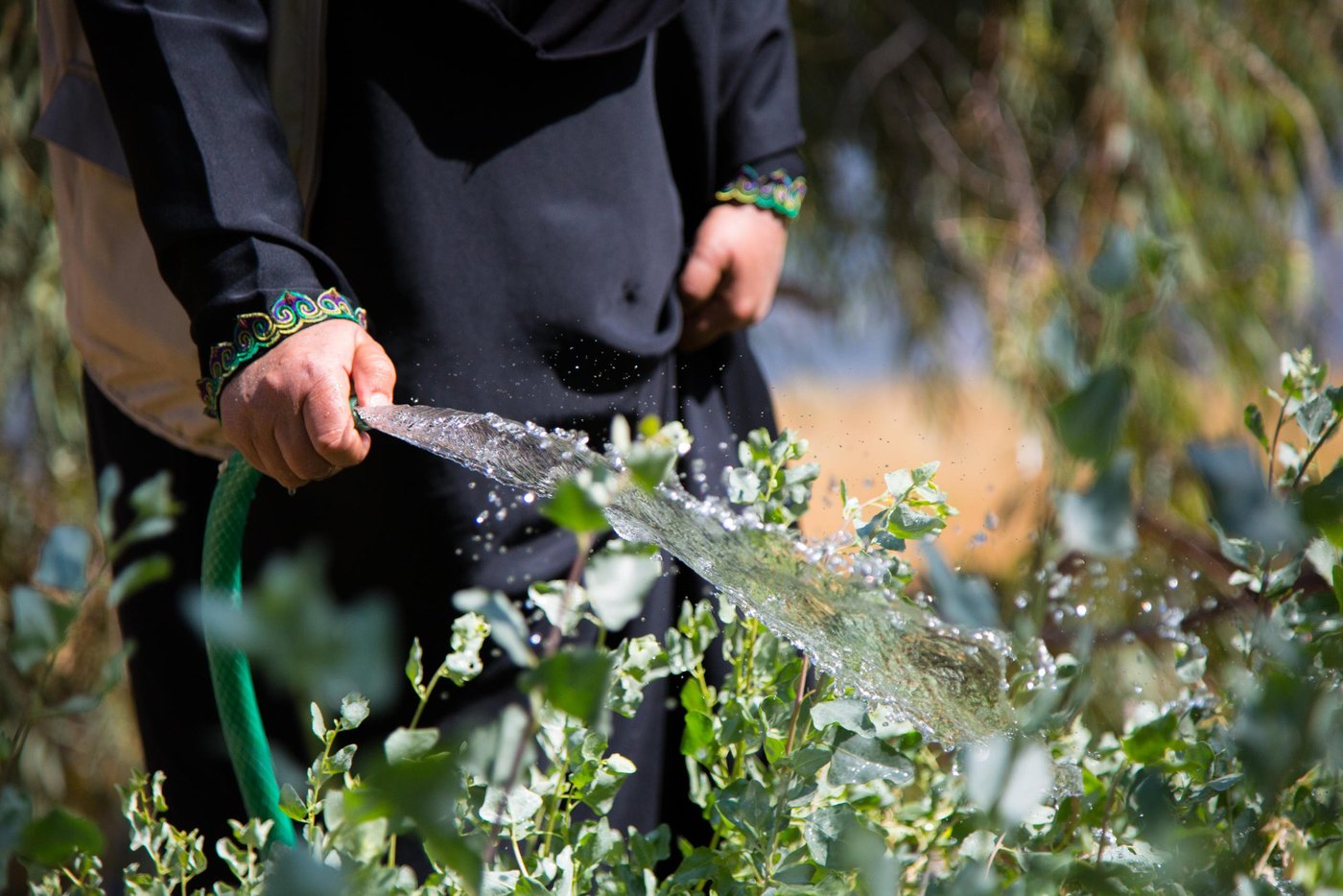
As long as it is a respectable job that I have, I fear nothing. I will work until I don’t need to work anymore.Amal Um Odai (55), Syrian refugee in Jordan
Women work to pay off their families' debts
Syrian mother of seven, Amal Um Odai (55), fled to Jordan in 2012, along with her aging husband and three of their children. "We left Dar’a in Syria after sunset, and after five hours on foot through the night, we arrived at the Jordanian border just before sunrise. The Jordanian border control were very kind and welcoming," she recalls. Her family stayed in Za’atari refugee camp their first few months in Jordan before they moved to Jerash in north-western Jordan to escape the difficult living conditions and the overcrowding of Za’atari at the beginning of the crisis.
In Jerash, Amal joined the Norwegian Refugee Council (NRC)’s livelihood cash for work (CfW) project focused on improving infrastructure. She is one of many Syrian and Jordanian women who are now engaging in the labour market to support their families, although working women are, in many places, frowned upon by their communities. As the crisis and the associated displacement continues, many Syrian families living in host communities are forced to borrow money from their neighbours or relatives to pay for the high cost of living in Jordan. Amal wanted to avoid this, but her husband is retired, and her twenty-one-year-old son, Odai, struggles with high blood pressure and back issues after being the victim of child labour after the crisis in Syria broke out.
“We were forced to find jobs, because we were in need; we had no one paying our rent or bills. Our priority now is securing money to pay the rent every month to keep a roof over our heads. In Syria we owned our houses, we owed money to no one,” Amal says. “We planted our own fruits and vegetables, we baked our bread. We started worrying about money the second we left our home back in 2012, and we still do until this day.”
Amal fully supports the idea of women’s participation in the labour market, especially now that she has experienced working in the cash for work-project, even encouraging her daughter to join her. “The society doesn’t interfere, as long as it’s a respectable job that we are doing”, she explains. Small-scale programmes in for example agricultural production have created the opportunity for many women to earn additional income for their families, and many of them now go to work proudly, without letting societal pressure affect the lives of them nor their children.
I am very comfortable and happy now, working with this NRC project. The Jordanian women I met here are lovely; I consider them sisters now. We don’t have a language barrier, and we share the same traditions.Amal (55)
Female participation in the labour market
Planting season starts in November in the north. Amal joined the project with a group of twenty other women. Each group usually only works on the site for forty days. The women oversee the management of seedlings which will be planted in the Royal Botanical Garden.
137 women have participated in the project so far, of which 85 are Jordanian and 52 are Syrian.
Watering your plants and watching them grow… it feels like you are watching your children grow in front of you.Amal (55)

Amal enjoys spending her time at the dam with the other women, being productive and putting her free time to good use. Making friends with other Syrian and Jordanian women, as well as the NRC staff, is Amal’s favourite part of the job. “It feels like I have known them for so long, although it’s only been a few months,” she says.
The Cash for Work in the Water Sector Project
Through our role in The Deutsche Gesellschaft für Internationale Zusammenarbeit (GIZ)’s Cash for Work in the Water Sector Project, we provide short-term employment for Syrian refugees and to economically vulnerable Jordanians who are unable to find alternative forms of employment in the local job market. The project aims to prevent soil erosion into the freshwater dams throughout Jordan, protecting the country’s delicate water resources. These labour-intensive activities include fence repair and construction, tree plantation, waste collection and other activities that contribute to the protection of Jordan’s water resources. Each labourer is given the opportunity to work for 40 days and is paid either 14 or 17 JOD per day depending on their relative skill level.
As this project primarily involves demanding physical labour, this can potentially deter female participation. In light of this, NRC works to encourage female participation as much as possible in activities such as working in nurseries to propagate seedlings for future planting and working to produce vests and other materials to be used by all labourers.


